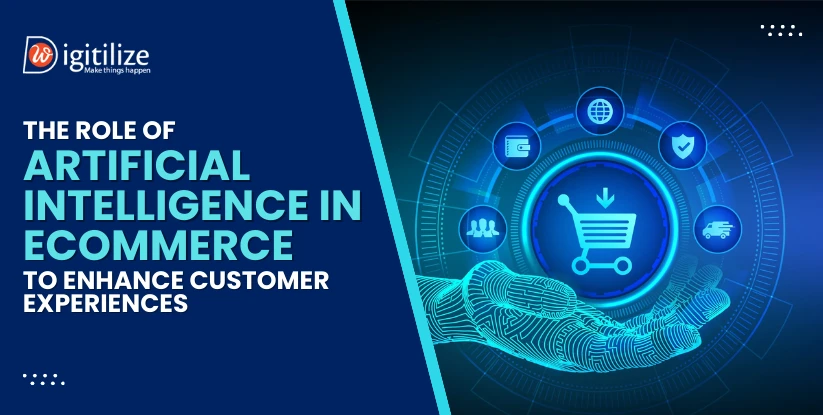The Role of Artificial Intelligence in Ecommerce to Enhance Customer Experiences

Artificial intelligence (AI) technology has been embraced by the ecommerce sector early on. This industry agrees on the role of Artificial Intelligence in ecommerce to enhance customer experiences.
And that’s only one instance of the application of AI in real life. Sellers may now rely on GPT4-enabled customer assistance and use generative AI to create product descriptions. Teams will soon be able to start whole marketing campaigns that are custom to each buyer and produce paid advertising content.
AI helps ecommerce merchants and enterprises expand their operations and creative departments in addition to making consumer online purchasing easier. This article will discuss the applications of AI in ecommerce, real-world instances of AI in operation, and potential implications for buyers and sellers in the future.
Artificial Intelligence (AI) in Various Ecommerce Domains
The majority of internet purchases begin with a search. Relevant results should be displayed based on the keywords. If not, the user will search elsewhere for items involving artificial intelligence. The results of the text-based searches are a list of products with those keywords in the title and description.With the application of artificial intelligence (AI) in business intelligence and ecommerce, customers may upload a picture annotation and find the most precise or relevant search result. Hence, the customer saves a great deal of time because they are no longer need to stay for hours on end.
B2C and B2B ecommerce system development benefits from the application of AI in ecommerce methods. About 80% of the ecommerce sector is made up of B2B transactions, with B2C accounting for the remaining 20%. However, B2C transactions have received a lot of attention in data science, business intelligence, and artificial intelligence for ecommerce development.
AI in B2C Ecommerce
AI is predominantly utilised in B2C ecommerce products for things like product selection and suggestion, negotiation, auctions, boosting server scalability and addressing real-world scheduling difficulties, producing automated answers, and judgments about how to bundle and price goods, among other things. The primary use of AI in B2B ecommerce is in supply chain management. Both kinds of ecommerce systems make use of AI technology, specifically ontologies. The role of Artificial Intelligence in ecommerce to enhance customer experiences of B2C ecommerce systems is discussed in this section.Artificial Intelligence in Business-to-Business Electronic Commerce
SCM is essential to B2B marketplaces’ performance. It is therefore essential for B2B ecommerce as well. The relevance of supply chain management, or SCM, has increased due to the growth of ecommerce, as businesses are forced to reengineer their operations as they migrate online.
A supply chain management is a network of autonomous or semi-autonomous business entities that are in charge of purchasing, manufacturing, and distributing goods, or they can be involved in one or more families of related artificial intelligence product families. So, it is the foundation of ecommerce. Businesses may share information in real-time and cut their inventory-carrying expenses substantially with an integrated supply chain. When it comes to B2B ecommerce, this is crucial.
How AI is applied in ecommerce in 2024

Ecommerce is become a necessary component of daily life. 2.87 billion people are predicted to have made at least one online transaction by 2027.
You’ve undoubtedly used AI in ecommerce, just as you’ve undoubtedly made purchases on a mobile device. AI is being use more and more in the e-commerce industry to boost sales and engage consumers, whether it is through specific marketing based on previous purchases or AI-powered customer support bots. In fact, it’s predicted that the value of the AI market worldwide will top $2 trillion by 2030! Here are some instances of how AI is now being used in ecommerce.
-
AI that anticipates logistics and shipping
-
AI-powered virtual assistants for shopping
-
Virtual assistants and chatbots
-
Visual Product Search and Discovery
-
Optimisation of prices
-
Aspects and filters for improved product finding

AI-powered facets and filters are able to examine user preferences and behaviour. In addition to product information, it offers more precise and pertinent filtering choices. To provide individualised product suggestions, AI systems, for instance, might examine customer search queries and purchase histories. Moreover, alternatives are filter according to user behaviour and preferences. This is one of the role of Artificial Intelligence in ecommerce to enhance customer experiences.
Furthermore, more advanced filters and facets may be obtained with AI power. The refined alternatives for filtering based on characteristics that conventional filters would find difficult to capture. Artificial intelligence (AI) algorithms can improve the precision and usefulness of search results by proposing filtering alternatives based on colour shades, materials, and other properties by analysing the text in product descriptions.
-
Retargeting Consumers
Here’s where AI can be quite useful. It makes sure that leads that don’t convert don’t squander your marketing budget. To create tailored messages and offers to retarget potential consumers down your sales funnel, AI can analyse the data and give insightful analysis about the user.
-
Advanced Analytics
These dangers include things like data biases that aren’t intentional and privacy violations. The possibility of manipulating or misleading results might affect the way decisions take place. Therefore, to maximise the advantages of AI analytics while reducing these inherent hazards, close observation and ethical concerns are essential.
-
Remove Fake Review
So how can artificial intelligence handle this issue in ecommerce? To counteract fake product review and ratings on their listings, Amazon employs an algorithm powered by artificial intelligence. To identify fake reviews, it looks at the verified customer purchase tag and the “marked as helpful” metric from other users.
Top example of ecommerce where AI provides great user experiences

-
The Product Suggestion System on Amazon
-
Predictive Analytics at Starbucks
Artificial intelligence is becoming more important than ever for ecommerce, with so many application cases. This technology has numerous special benefits that others do not have, such as the ability to detect counterfeits and save time on repetitive chores while still providing excellent customer service. AI is omnipotent.
Moreover, ChatGPT and other generative AI technologies in ecommerce have the potential to completely transform how businesses communicate with customers. So, if you are looking for an ecommerce solution like this then you must hire developers from us. For more follow us on LinkedIn.
FAQ
Frequently Asked Questions
Yes, without a doubt! employing AI systems to perform things like automatically creating captions and round-the-clock chatbots can ultimately save you money by eliminating the need to pay personnel to perform these duties. Of course, employing AI systems comes with its own set of expenses and expenditures.
AI agents can handle some consumer requests totally on their own thanks to machine learning, which also helps them become more efficient and better forecast what customers need.
Digital marketing makes use of AI in a number of ways. Machine learning algorithms, for instance, may examine customer behaviour and assist marketers in making data-driven decisions.
AI has also completely changed e-commerce marketing tactics. Businesses may use AI algorithms to forecast consumer trends and behaviour, enabling more focused marketing efforts.
Yes, AI can help ecommerce businesses save money by automating tasks such as product description generation, providing round-the-clock customer support through chatbots, and optimizing logistics and shipping operations.
AI plays a significant role in customer support by enabling AI agents to handle a variety of customer inquiries autonomously, thanks to machine learning algorithms that continuously improve their efficiency and accuracy in addressing customer needs.

